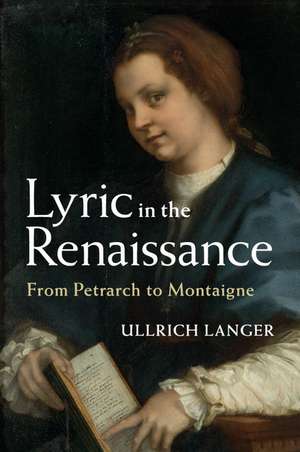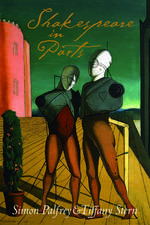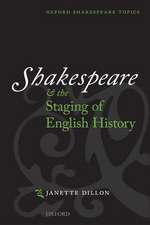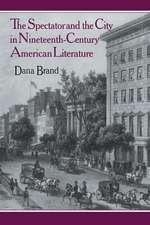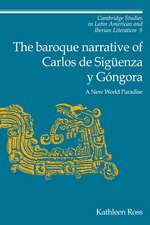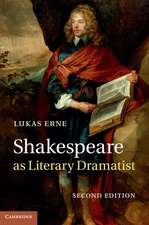Lyric in the Renaissance: From Petrarch to Montaigne
Autor Ullrich Langeren Limba Engleză Paperback – 18 oct 2017
| Toate formatele și edițiile | Preț | Express |
|---|---|---|
| Paperback (1) | 281.67 lei 6-8 săpt. | |
| Cambridge University Press – 18 oct 2017 | 281.67 lei 6-8 săpt. | |
| Hardback (1) | 692.50 lei 6-8 săpt. | |
| Cambridge University Press – 16 iun 2015 | 692.50 lei 6-8 săpt. |
Preț: 281.67 lei
Nou
Puncte Express: 423
Preț estimativ în valută:
53.90€ • 55.93$ • 45.05£
53.90€ • 55.93$ • 45.05£
Carte tipărită la comandă
Livrare economică 17-31 martie
Preluare comenzi: 021 569.72.76
Specificații
ISBN-13: 9781107526990
ISBN-10: 110752699X
Pagini: 226
Dimensiuni: 150 x 230 x 10 mm
Greutate: 0.31 kg
Editura: Cambridge University Press
Colecția Cambridge University Press
Locul publicării:New York, United States
ISBN-10: 110752699X
Pagini: 226
Dimensiuni: 150 x 230 x 10 mm
Greutate: 0.31 kg
Editura: Cambridge University Press
Colecția Cambridge University Press
Locul publicării:New York, United States
Cuprins
1. Introduction; 2. Petrarch and the existential singular; 3. Minimal lost worlds: the rondeaux of Charles d'Orléans; 4. Ronsard's singular erotic reciprocity (Les Amours de Cassandre); 5. Singularity as emptiness: Du Bellay's Regrets; 6. Montaigne and his 'sublime' lyric; 7. Conclusion; Bibliography.
Recenzii
'In this genuinely original and carefully meditated study, Langer is not interested in the lyric 'self' as usually construed or constructed, but rather in a series of textual phenomena that foreground the singularity and existence of individual objects and subjects. The power and the beauty of this book lie in its ability to give an alternate account of Renaissance lyric which avoids the Scylla of humanistic essentialism, on one hand, and the Charybidis of social-historical determinism, on the other, while offering a model of reading and understanding that is at once recognizable and 'estranging' in the very best sense.' Albert Russell Ascoli, Terrill Distinguished Professor, University of California, Berkeley
'Bringing his customary erudition and insight to bear on some of the most familiar works of the Renaissance, Ullrich Langer discovers surprisingly original effects of 'an 'existential singularity'', as distinct from classical ethos and pathos as it is from modern subjectivity. These sensitive, sympathetic readings offer an impressive reappraisal not only of first-person writing in the Renaissance but of the way Renaissance poetry was designed to act on its readers.' Edwin M. Duval, Yale University, Connecticut
'… offers a reading of early modern lyric that cuts obliquely across all of our usual categories for understanding the period, welcomingly unsettling both historicist and formalist perspectives alike.' Vanessa Glauser, Renaissance and Reformation
'… a rhetorically meticulous reading, historically informed without being historicizing, showing how a few carefully deployed rhetorical devices produce the startling affective jolts, the impression of wrenching selfhood and inexplicable, inexpiable yearnings that this poetry can still call forth.' William N. West, Modern Philology
'Bringing his customary erudition and insight to bear on some of the most familiar works of the Renaissance, Ullrich Langer discovers surprisingly original effects of 'an 'existential singularity'', as distinct from classical ethos and pathos as it is from modern subjectivity. These sensitive, sympathetic readings offer an impressive reappraisal not only of first-person writing in the Renaissance but of the way Renaissance poetry was designed to act on its readers.' Edwin M. Duval, Yale University, Connecticut
'… offers a reading of early modern lyric that cuts obliquely across all of our usual categories for understanding the period, welcomingly unsettling both historicist and formalist perspectives alike.' Vanessa Glauser, Renaissance and Reformation
'… a rhetorically meticulous reading, historically informed without being historicizing, showing how a few carefully deployed rhetorical devices produce the startling affective jolts, the impression of wrenching selfhood and inexplicable, inexpiable yearnings that this poetry can still call forth.' William N. West, Modern Philology
Notă biografică
Descriere
A wide-ranging study of the lyric as a literary genre in Renaissance Europe, by a leading scholar of the period.
